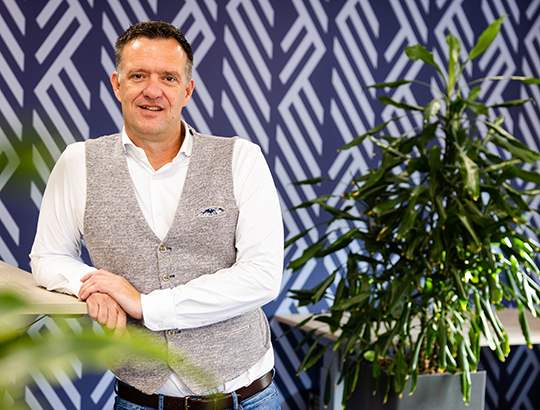
Boosting conversion
The maritime industry has a lot to consider right now. We live in a time of challenging economic circumstances, frequently changing regulations, and all the complexities of a climate crisis. Collectively, these factors are stimulating action and driving innovation, so that the sector is becoming increasingly dynamic.
Amongst the many transformations taking place, is an interesting new trend which, according to Saltwater CEO Sander Broekmeulen, offers an answer to many of the current industrial challenges. Conversions have long offered opportunities for diversifying a vessel’s scope of work. Typically, this has involved the removal and addition of certain components and equipment. This modular approach to conversion provides flexibility for the future. Once a contract is ended, the vessel can be repurposed for the next one. Recently, however, the maritime and offshore engineering specialist has witnessed an increase in orders for the long-term conversion of existing vessels, in place of newbuild projects.

Certainty in uncertain times
“This is certainly an interesting option if you consider the present economic climate,” begins Sander. “Energy prices are rising dramatically, and this is having a substantial effect on the cost of, for example, materials. Investing in an existing vessel takes away of lot of that price uncertainty and risk.”
Taking the lead
Another advantage is the lead times. With a considerable amount of both engineering and construction already undertaken, a converted vessel can be in the water very quickly. Naturally, this results in a reduction in man-hours, which also adds to the overall cost-reduction. “It depends on the extent of the conversion, but I would expect even a complex project to deliver a significant saving relative to a newbuild,” states Sander. “Plus, developing a vessel in a modular manner like this offers opportunities for the future. Once a contract is ended, you can easily repurpose for another one.”
Broad-reaching potential
Saltwater has just completed such a project, having engineered the conversion of a laid-up platform supply vessel to a cable-layer for the telecommunications sector. Previously, the company has worked on projects that have seen diverse vessels repurposed for offshore wind support vessels, adding accommodation units, cranes, support craft or walk-to-work systems.
In fact, this type of conversion is increasingly being seen throughout the maritime industry; even superyachts have been created out of retired fishing vessels and redundant offshore ships.
Climate conscious conversion
The benefits of this go beyond reducing the time and costs of vessel operation. At a time when the maritime industry is being tasked with improving its environmental performance, recycling a ship offers a robust contribution. Giving a ship a second life reduces waste and avoids the footprint of building a new vessel. Additionally, it provides an ideal opportunity to install the latest technology to improve performance.
“We’ve carried out projects involving the retrofit of ballast water treatment systems, for instance. And, with all kinds of test cases being explored right now, there is the potential to switch to alternative fuels such as hydrogen or methanol. “These are considerably adjustments, but when you are already undertaking a large-scale conversion, the timing is perfect.”
Getting from A to B
As with all good solutions, preparation is key to a successful vessel conversion. And it is here, Sander explains, that Saltwater can provide support. “It’s important to be sure that the vessel you choose can perform the function you want it to. It’s not simply a case of saying ‘I bought vessel A, please convert it to vessel B’.
“What we can do, is sit down with the client and develop something together. Our role involves carrying out research on your behalf, performing feasibility studies and producing concept designs. “Once we know what it is you are looking for, we can approach the brokers and see what suitable vessels are on the market. In this way, we make sure that you are going to get the results you are looking for.”
Armed with information
Rob Grimmond, Managing Director, Castle Ship International agrees with Sander’s assessment. The process, he says, benefited considerably from Saltwater’s experience in the field of vessel conversions. “There’s a lot to consider when undertaking a conversion like this especially into a multi role capability. Platform Support Vessels are built with a generic purpose in mind. Converting them for a specific task(s) is an intricate matter and requires proper definition of the design criteria and excellent knowledge of the applicable Rules and Regulations and relevant experience. Therefore, having access to independent expert advice and guidance, like Saltwater, is key to selecting the right ship for the job and ensuring it meets cost and time budgets.